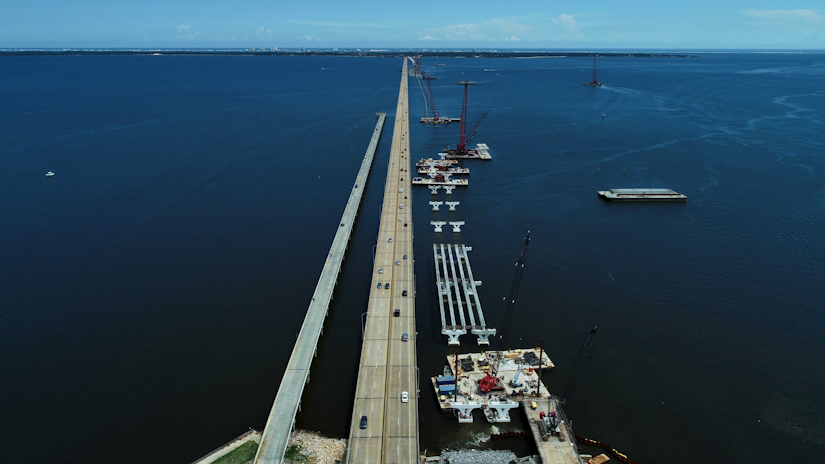Thousands of small cracks have halted Pensacola Bay Bridge construction twice. FDOT says they are safe

Photo: Florida Department of Transportation.
The Florida Department of Transportation (FDOT) has addressed thousands of cracks that have been found in the newly poured concrete of the Pensacola Bay Bridge, calling the cracks “superficial,” and “not structural.”
According to a report from the Pensacola News Journal, FDOT called a press conference to discuss the cracks after reports surfaced that work on the $400 million bridge replacement project, the largest such project in North Florida history, had been stopped on two occasions “because of cracks in the concrete.”
Director of Transportation Development, Jared Perdue, P.E., and Eisman & Russo Construction Engineering Inspection Program Director Brett Pielstick, P.E., were on hand to field questions about the cracks.
Pielstick stated that the cracks are less than 1 centimeter wide, varying from 3 inches to 18 inches long. The cracks were found in nine sections of the concrete during an inspection, with anywhere between 300 and 1,300 cracks in each section. About one mile of concrete has been poured on the project as of last week.
Pielstick assured reporters that cracks like those seen in the new Bay Bridge were “common” in large bridge projects and are caused by a mixture of things, including the weather. Pielstick said concrete placement on the bridge was halted so that engineers to reevaluate the issue and put new methods in place.
According to the News Journal, contractor Skanska Civil USA South poured the bridge decks “about half an inch above the required height.” Pielstick said most of the cracks are so insignificant that they will be buffed out by machines used to smooth the bridge surface.
“These are not structural cracks, they are superficial cracks,” he said.
Pielstick and Perdue said no prior announcement had been made about the cracks and work stoppages because “FDOT officials did not believe the public was in any danger from cracks.” However, Jeff Bergosh, chairman of the Escambia County Commission, said while he trusts what Perdue and Pielstick have said about the severity of the cracking, he would have liked to have been made aware of the issue after the second work stoppage.
“I’m not a structural engineer, but I think after the second stoppage, they should have notified the TPO (Transportation Planning Organization),” Bergosh told the News Journal.
The project is on-schedule for the eastbound bridge to be completed in early 2019.
from Equipment World https://ift.tt/2vmcac9
via Handy Rep Ai
Comments
Post a Comment